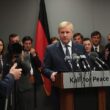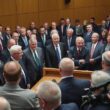Germany’s domestic intelligence agency chief has issued a stark warning regarding Russia’s sustained and deliberate efforts to influence German politics. Sinan Selen, head of the Federal Office for the Protection of the Constitution (BfV), stated unequivocally that Moscow is actively seeking to cultivate a climate within Germany that favors authoritarian ideologies while undermining support for liberal democratic principles.
Selen’s assessment paints a disturbing picture of a calculated campaign specifically designed to shift public sentiment and, crucially, penetrate the political decision-making process. While not limited to specific individuals or political factions, he noted a significant concentration of overtures aimed at the political fringes, both on the left and the right, suggesting a deliberate strategy to exploit existing societal divisions and vulnerabilities. These attempts, he said, involve a concerted effort to disseminate and normalize “Russian narratives” challenging the legitimacy and stability of Western democracies.
The accusations echo recent allegations from Thuringia’s Interior Minister, Georg Maier, who publicly suggested the Alternative for Germany (AfD) party might be acting as a conduit for Russian intelligence, purportedly utilizing parliamentary ” Kleine Anfragen” (small inquiries) – a formal mechanism for posing questions to government officials – to facilitate information gathering. While BfV has not directly commented on the AfD accusations, Selen’s statements lend credence to the growing concerns surrounding the party’s interactions with pro-Kremlin elements.
Beyond traditional disinformation campaigns, Selen emphasized the evolving nature of the threat, highlighting a “new situation” characterized by the simultaneity of multiple, complex dangers. These include ongoing international terrorism, hybrid threats encompassing espionage, sabotage and cyberattacks and even “kinetic attacks” – a chilling term referring to targeted killings – impacting European nations.
The BfV chief acknowledged the strain this multi-faceted threat landscape places on the agency, but expressed confidence in his ability to maintain oversight and manage the challenges. He emphasized that this isn’t a hypothetical or future risk, but a present reality – a “hybrid war” actively waged against Germany. This requires a shift in approach, moving beyond theoretical threat assessments to actively confronting and mitigating ongoing operations. The BfV’s current focus is now on proactively addressing this “present reality” and hardening Germany’s defenses against Russia’s escalating influence campaign.





